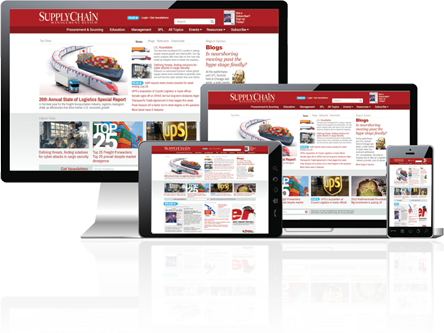Tariffs Won’t Deter Industry 4.0
It is easy to understand the frustration that drives some to support tariffs and protectionism. None of this means that the tariffs will work. And supply chains are the reason why.
Latest News
Supply Chain Services acquires Dasco Label Automated storage and retrieval system (ASRS) market worth $10.7 billion by 2025 Trucking comeback: Dohrn Transfer turns the corner with assist from Pitt Ohio JSCM Video: Managing buyer-supplier conflicts JSCM Video: Managing buyer-supplier conflicts More NewsLatest Resource
Simplifying Your End-to-End Supply Chain Download this report highlighting each point on the supply chain journey by explaining the role it plays, which includes the pain points you may face, what you should be thinking about at a particular stage in the journey, and what technology you can benefit from.
Download this report highlighting each point on the supply chain journey by explaining the role it plays, which includes the pain points you may face, what you should be thinking about at a particular stage in the journey, and what technology you can benefit from.
All Resources
There are legitimate gripes against the way some of our major trading partners do commerce with the United States. China willfully engages in intellectual property theft from companies hoping to do business in the country.
Outside the country some companies report weekly cyber-attacks from Chinese hackers who are after their intellectual property. China and most EU countries have banks that are heavily or outright owned by their governments, allowing them to print as much money as required to prop up zombie corporations and non-competitive companies.
It is easy to understand the frustration that drives some to support tariffs and protectionism. None of this means that the tariffs will work. And supply chains are the reason why. Here are some observations.
Modular innovation – Modern products are complex, they require inputs and knowledge from specialized clusters around the world. Some clusters have built up around raw materials that are only found in a few places around the world such as “blood minerals” for electronics. Other clusters are the result of decades of experience and talent development. Think Silicon Valley and Digital Media City in Seoul. Modern product innovations depend on the recombinatorial possibilities of mixing and matching inputs from these specialized clusters, and most new products are assembled from components that are modular in nature.
Growth Happens Overseas – Growth markets are all overseas. Therefore, tariffs are going to encourage even American companies to produce overseas, for much the same reason that Toyota and Honda ended up building plants in the U.S.
The New Wealth – Wealth usually means the possession of things that have economic value, like money. Certainly, material and countable assets have their uses. Yet there are signs that societies increasingly capture value from non-countable assets. We’re on track to achieve 50 times the growth of “big data” from 2010 to 2020, and the internet means that knowledge is international and universal, or at least highly portable. Compare data growth to global GDP that has averaged 3-4% per year for the past decade. Money isn’t the only way to conduct exchanges, and increasingly knowledge has more value. Knowledge has now become very easy to exchange across international borders. As societies intensify focus on knowledge, it will become both more challenging to assign a dollar amount to exchanges and easier to shift costs up and down the supply chain to work around tariffs and other barriers. Some countries have already made an art-form of this, and so have companies like Amazon, Apple and Alibaba.
People Matter More than Ever – In a world flush with information and a certain level of science and technology, the focus will shift back to the least developed resource: people. At its annual meetings in Bali this October, the World Bank is launching a new index to measure how human capital contributes to the productivity of the next generation of workers. The index will measure the health and education that a child born today can expect to achieve by the age of 18. Like the “Ease of Doing Business” index, the human capital index will help countries to make proper investments to improve their most important resource.
The global sprawl of supply chains now matters more than ever and will define international relations for the next generation. Supply chain managers sit in the key connecting role in a world that depends more than ever on connections. Navigating the era of protectionism and tariffs will drive you to invest more in things that don’t have tariffs, such as people, data and innovative product designs.
This will increasingly happen overseas near the high growth markets, which means increasing reliance on data, sensors, AI and other Industry 4.0 technology. It’s going to be an exciting and increasingly international world regardless of tariffs.

About the Author
 Michael Gravier
Michael Gravier is a Professor of Marketing and Supply Chain Management at Bryant University with a focus on logistics, supply chain management and strategy and international trade. Follow Bryant University on Facebook and Twitter.
Michael Gravier
Michael Gravier is a Professor of Marketing and Supply Chain Management at Bryant University with a focus on logistics, supply chain management and strategy and international trade. Follow Bryant University on Facebook and Twitter.

Subscribe to Supply Chain Management Review Magazine!
Subscribe today. Don't Miss Out!Get in-depth coverage from industry experts with proven techniques for cutting supply chain costs and case studies in supply chain best practices.
Start Your Subscription Today!
 Simplifying Your End-to-End Supply Chain
Download this report highlighting each point on the supply chain journey by explaining the role it plays, which includes the pain points you may face, what you should be thinking about at a particular stage in the journey, and what technology you can benefit from.
Download Today!
Simplifying Your End-to-End Supply Chain
Download this report highlighting each point on the supply chain journey by explaining the role it plays, which includes the pain points you may face, what you should be thinking about at a particular stage in the journey, and what technology you can benefit from.
Download Today!
 When COVID-19 was bringing other supply chains to a screeching halt, AGCO acted early and decisively to keep its operations around the world up and running. The key: A very agile supply chain.
When COVID-19 was bringing other supply chains to a screeching halt, AGCO acted early and decisively to keep its operations around the world up and running. The key: A very agile supply chain.
Supply Chain Management is not enough Risk Management in an Era of Extreme Uncertainty View More From this Issue
 Master Your Supply Chain with an Intelligent Control Tower
Today’s control towers provide powerful capabilities and real-time responsiveness with Autonomous Problem-Solving, Global Demand-Supply Matching and Global Available-to-Promise.
Register Today!
Master Your Supply Chain with an Intelligent Control Tower
Today’s control towers provide powerful capabilities and real-time responsiveness with Autonomous Problem-Solving, Global Demand-Supply Matching and Global Available-to-Promise.
Register Today!











